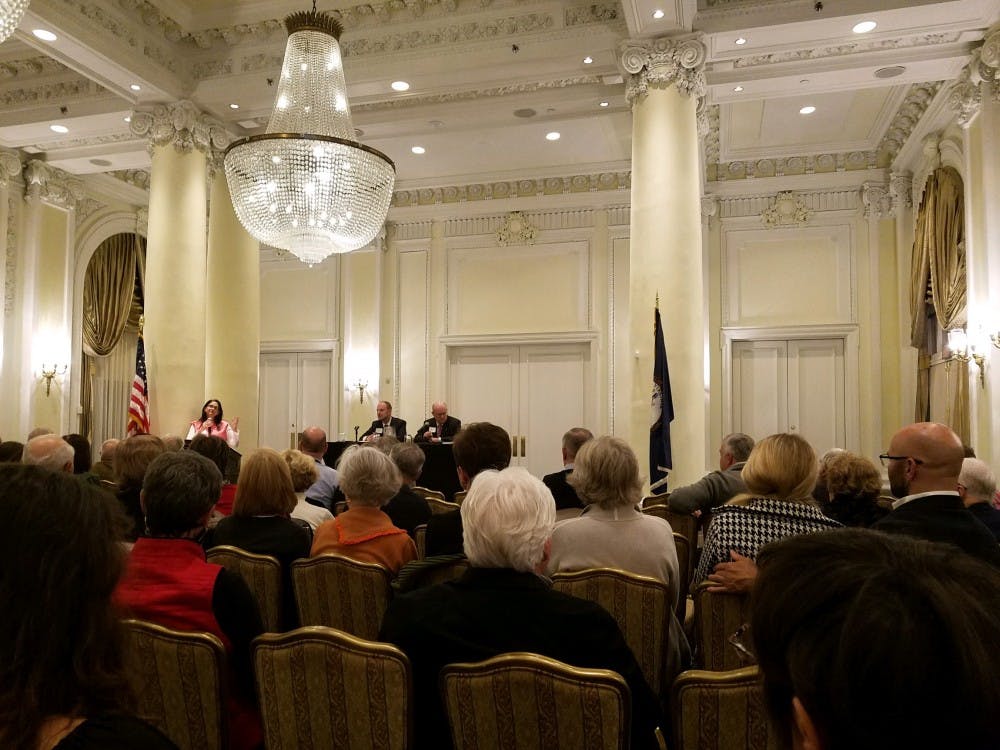The grandiose gold-lined Empire Room at the Jefferson Hotel was packed with an array of guests from all over the city of Richmond.
Attendees sipped glasses of wine and liquor as they seated themselves for the night’s big event -- “The North Korea Dilemma,” a panel hosted by the Richmond World Affairs Council with featured guests Todd Sechser of the University of Virginia and Col. Lawrence Wilkerson of the College of William & Mary.
“The [United States] has two goals, deterrence and coercion," Sechser, who specializes in politics and public policy, said. "The first goal is much more achievable.”
The central goal of deterrence, Sechser explained, is to persuade an adversary that the costs of action are greater than the results. For the U.S. to successfully practice deterrence, the country must exemplify four criteria:
- Commitment to a cause
- Asymmetrical power balance
- Global credibility
- Deep understanding of the adversary
It is the fourth criterion where the U.S. has struggled the most because of North Korea’s extremely insular government and also its unpredictable leader, Kim Jong Un, Sechser said.
Leaders of small countries, such as Kim Jong Un, who face off with extremely powerful adversaries, such as the U.S., often obsess with their global image. Sechser called this obsession the “superiority paradox” and said this had emboldened Kim to take extreme measures to create the illusion of power and equal standing between North Korea and the U.S. In this case, the extreme measures are nuclear arms.
Thus, strong rhetoric and aggressive actions could be detrimental in neutralizing the Kim regime because it could push Kim into a wall where he feels forced to either take direct action against the U.S. and its allies or to double down on North Korea’s nuclear arms projects, Sechser said.
Instead, Sechser argued that the U.S. should practice reassurance and signal to Kim that its goal is not to overthrow his regime, while maintaining a firm no-tolerance policy toward North Korean aggression.
Although it would be unlikely for North Korea to end its nuclear arms program, Sechser expressed confidence that the U.S. would be able to at least neutralize North Korean hostility.
“Deterrence works not because it is a happy outcome, but because it is the least bad outcome,” he said, concluding his portion of the panel.
Wilkerson’s portion of the panel began with a critical overview of U.S. overseas affairs.
Enjoy what you're reading?
Signup for our newsletter
“If we are the world’s manager, we have been doing a very lousy job,” he said.
Wilkerson, who was the former chief-of-staff for George W. Bush's secretary of state Colin Powell, played a large role in propelling the U.S. into war with Iraq. Today, he is a powerful critic of the Iraq War and American policies in the Middle East and East Asia.
For his portion of the panel, he focused on U.S. and South Korean relations and claimed that the Trump administration was jeopardizing this relationship.
“We do not think of our allies," Wilkerson said. "We do not. I’m watching the president of the United States ignoring the president of South Korea to the extent that Kim Jong Un has a 50/50 chance of doing irreparable damage to the U.S. alliance [with South Korea]. That is one of his primary strategic objectives to break the United States and South Korea apart.”
Wilkerson went on to say that U.S. military involvement in Iraq, Libya, Syria and perhaps Iran is what pushed North Korea to develop and further its nuclear arms program.
“[North Korea] came to the conclusion that ‘If I have a nuclear weapon, [the U.S.] won’t do it to me. If I don’t have nuclear weapons, there is the possibility that they will do it to me,’” he said.
Near the end of his presentation, Wilkerson circled back to the Trump administration and its role in the North Korea dilemma. He said with confidence that the two Koreas would be unified within the next generation. However, there was one problem, he said: South Koreans view the U.S. as an impediment to unification because of the Trump administration’s paternalistic attitude in dealing with Korean affairs.
If the relationship between the U.S. and South Korea continued to deteriorate, Wilkerson projected that the South Korean government would push the U.S. out of Korea, and Kim Jong Un – backed by the power of his nuclear arsenal – would be free to enact his will upon the peninsula.
Contact senior news writer Joshua Kim at joshua.kim@richmond.edu.
Support independent student media
You can make a tax-deductible donation by clicking the button below, which takes you to our secure PayPal account. The page is set up to receive contributions in whatever amount you designate. We look forward to using the money we raise to further our mission of providing honest and accurate information to students, faculty, staff, alumni and others in the general public.
Donate Now



